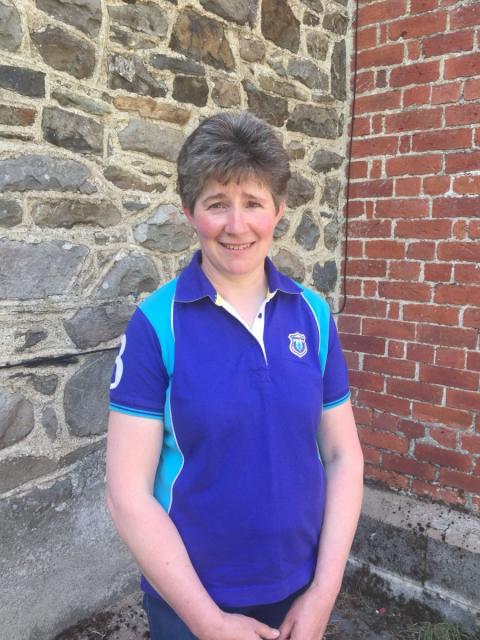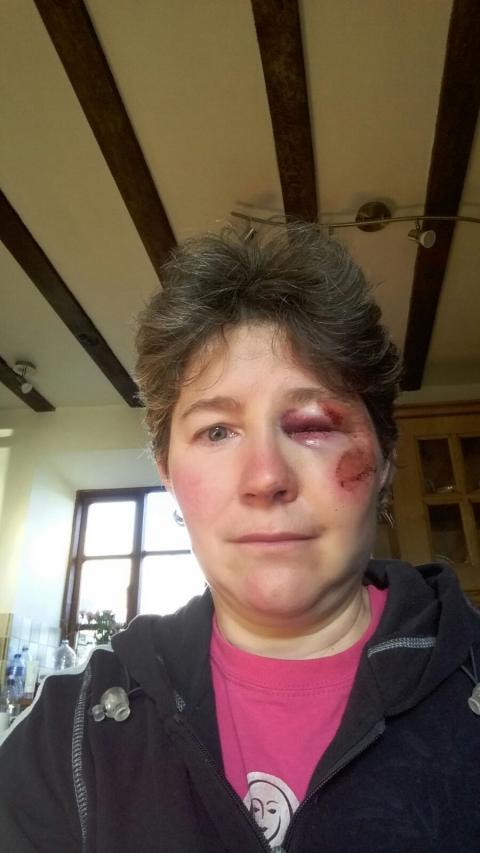7 August 2018
Experienced Powys farmer Corrine Mathias took almost six months to get back to full health after a terrifying accident on her family farm just over fifteen months ago. Corrine, who works locally as a part time nurse, was barged, butted and trampled by cow which had recently calved.
“There are so many things I should have done differently that day now I look back.”
“I completely underestimated the risk from unrestrained cattle, especially the overly protective instincts of newly calved cows.”
Keen to highlight the importance of reducing the risk of farm accidents, Corrine is now lending her support to a campaign launched last month by the Wales Farm Safety Partnership (WFSP), a collaboration of all the key agricultural stakeholders in Wales.
Supported by Farming Connect, the campaign includes two training events later this month (RWAS Showground Builth Wells - 28 August 2018 and Ruthin Livestock Market - 29 August 2018); a free or downloadable farm safety ‘top tips’ booklet and up to 22.5 hours of fully-funded, confidential on-farm guidance from approved ‘farm health and safety’ mentors.
Corrine’s accident happened at the family’s third generation Bryn Farm in Howey, a 300 acre beef and sheep holding. She says the day will be imprinted on her brain forever not just because some of her physical scars will never completely disappear but because the memory of what happened is still so vivid.
Her husband and son had gone to a local football match so she decided to walk the family’s two dogs. As she walked past the cattle shed, she spotted one cow that was obviously in the early stages of labour. She rang her husband who said the game had been cancelled and they were on their way home to help.
“I decided to keep a look out from the shed entrance and could see she delivered the calf fairly easily, but despite her best efforts, there was no sign of it breathing so I went closer to investigate,”
Well aware that even the calmest of animals can get spooked when they’ve delivered offspring, Corrine kept a close eye on the calf’s mother, which was still lying down. As it didn’t seem at all anxious or put out by her presence, she started clearing the calf’s airways. But just as it started to breathe, she was knocked to the floor by a different cow which had calved about a week earlier, taking her by complete surprise as it came up quietly but angrily behind her.
“It barged me to the floor and then kept on butting me in the face with its head. I was so shocked and
frightened that I can’t really remember much after that, so the medics think it’s possible that I also banged my head on the concrete wall as I fell.”
Corrine struggled to get up - it later transpired it had trampled her leg too - but the cow kept on knocking her down again into a corner. After what seemed an eternity but was probably only a few minutes, it got distracted and turned away for a few seconds, giving her just enough time to stumble to her feet and reach safety behind the barrier.
“I collapsed on a grassy bank in a muddy heap with blood dripping from my nose. I think I was still in shock because I couldn’t work out what was hurting. I still had my mobile in my pocket, so I managed to call Robert again to say a cow had got me down and asking how soon he could reach me.”
Despite being in a lot of pain, Corrine made her way to the house where she soon realised her nose was still bleeding, one side of her very grazed face was swelling up badly and her leg was throbbing and painful. When the boys arrived soon after, they immediately took her to the minor injuries unit in Llandrindod hospital, from where after checks, she was referred straight to Hereford hospital.
After further examinations and x-rays, the medical team in Hereford diagnosed that in addition to bruising and compression, the most serious injuries were a broken eye socket and cheekbone as well as the badly trampled leg which was very swollen and developing a large blister.
Corrine was off work for six weeks, and only able to go back to work on a phased return. Although she was advised that her eye had dropped very slightly, she opted against an operation to insert a small plate, as it wasn’t causing her any problems with her vision.
“It was a long haul to recover, which impacted on Robert and Geraint too.
“In the early days, I kept having flashbacks and my whole body came out in bruising, making it very painful and uncomfortable to move around or sleep.”
Corrine registered with a local leg clinic which she says speeded up her recovery process but there will always be evidence of the trauma to her leg and she still sometimes experiences numbness to the side of her face.
She does still help out with the farming, although son Geraint is now more involved and student daughter Rebecca helps out when she’s home.
“Seeing the next generation getting involved is one of the reasons I’m so keen to promote the importance of farm safety which is the only way to reduce the risk of farm accidents. There’s so much we must all do to make our farms safer places to work.”
Brian Rees, who chairs the WFSP, says that by adhering to H&S guidance, many farm accidents could be avoided or the risks significantly reduced.
“Most farmers know exactly what safety procedures they should have in place, but pressure of work and demands on their time means too many of them take short-cuts which increase the risk of accidents.
“Statistics show that many accidents involve working with unrestrained animals. Some of these are minor but some are life-changing or even fatal.
“It’s essential to have good handling facilities and a proper race and crush suitable for the type of cattle that you have. In this particular case, individual calving pens would have helped,” said Mr. Rees.
TOP TIPS WHEN HANDLING LARGE ANIMALS
The following advice on safe cattle handling has been taken from the WFSP’s new booklet.
- All those handling livestock must be trained and competent
- Always use proper handling facilities, kept in good working order
- Always use a properly designed race and crush suitable for the animals you work with and the tasks you are completing
- Ensure a rigorous culling policy for temperamental animals
- Never underestimate the instincts of a recently calved cow
- Try to avoid working alone with large animals
To book your place at one of this month’s training events click here, or to download the booklet or to apply for fully funded farm health and safety guidance available through the Farming Connect mentoring programme, click here or call the Farming Connect Service Centre.


